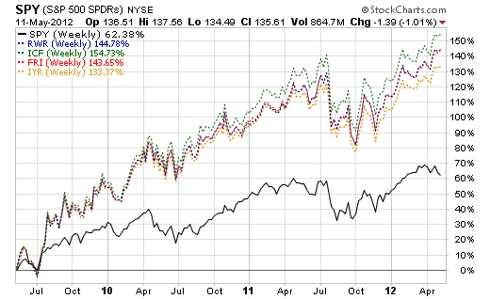Why REIT ETFs Are Beating The Stock Market This Year VNQ ICF REZ
Post on: 16 Март, 2015 No Comment

After shunning real estate investment trusts last year, investors are rebuilding their positions in companies that buy and rent real estate.
REIT ETFs have been among the few sectors beating the stock market so far this year. Vanguard REIT Index (ARCA:VNQ ), the largest in its category with $22 billion in assets, has jumped 11% year-to-date, far surpassing the SPDR S&P 500’s (ARCA:SPY ) 1% gain. It’s a remarkable turnaround after adding only 2% when SPY popped 32% in 2013.
IShares Residential Real Estate (ARCA:REZ ) has also vaulted 13% year-to-date, while IShares Cohen & Steers REIT (ARCA:ICF ) is up 12%.
Investors have been flocking to income-generating assets as interest rates fell this year despite the Federal Reserve’s plan to scale back its unprecedented economic stimulus, which was expected to lift interest rates. Yields on benchmark 10-year Treasury notes are down 28 basis points so far this year to 2.72% as of Wednesday from 3.00% at the start of the year.
The average public REIT has a yield of 3.5% much better than other alternatives and more sustainable if the economy does recover from its current anemia, Christian Wagner, CEO of Longview Capital Management in Wilmington, Del. said in an email. Builders continue to bring more product online due to low costs of funds. And in the event that we do have a significant upturn, their inventory will be sufficient to fulfill demand.

VNQ currently shows a 12-month yield of 2.9%, REZ 3.6% and ICF 3.2%, according to Morningstar. Among the biggest holdings in VNQ, Simon Property Group (NYSE:SPG ) is up 10% this year, Public Storage (NYSE:PSA ) 13% and Prologis (NYSE:PLD ) 12%. Top gainers among VNQ’s 131 names are Ashford Hospitality Trust (NYSE:AHT ), up 28%, and Camden Property Trust (NYSE:CPT ), up 20%. They each account for less than 0.5% of VNQ’s assets.
REITs such as Simon, which invest in shopping centers and retail locations, should benefit from rising consumer spending and retail sales anticipated over the next year, says Robert McMillan, an analyst at S&P Capital IQ.
Most of the retail REITs have long-term leases with their customers, with embedded rent adjustments that should help insulate them from economic fluctuations, he wrote in an equity report April 5.
We expect tight credit conditions, though not as restrictive as they were at the height of the financial crisis in late 2008 and 2009, to continue to squeeze smaller, undercapitalized players from the market as larger retailers seek to do business with shopping -center operators that can execute in a still tight and volatile credit environment.














